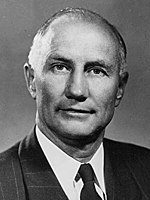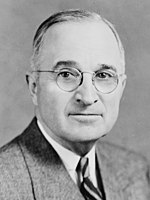| |||||||||||||||||||||||||||||
| |||||||||||||||||||||||||||||
| |||||||||||||||||||||||||||||
| |||||||||||||||||||||||||||||
| Elections in South Carolina |
|---|
 |
The 1948 United States presidential election in South Carolina took place on November 2, 1948, as part of the 1948 United States presidential election. State voters chose eight electors to the Electoral College, which selected the president and vice president.
South Carolina was won by States' Rights Democratic candidate Strom Thurmond, defeating the Democratic candidate, incumbent President Harry S. Truman, and New York Governor Thomas E. Dewey.
For six decades South Carolina had been a one-party state dominated by the Democratic Party. The Republican Party had been moribund due to the disfranchisement of blacks and the complete absence of other support bases as South Carolina completely lacked upland or German refugee whites opposed to secession.[2] Between 1900 and 1944, no Republican presidential candidate ever obtained more than seven percent of the total presidential vote[3] – a vote which in 1924 reached as low as 6.6 percent of the total voting-age population[4] (or approximately 15 percent of the voting-age white population).
This absolute loyalty to the Democratic Party – so strong that even Catholic Al Smith in 1928 received over ninety percent of South Carolina's limited vote total at the same time as five former Confederate states voted for Herbert Hoover[5] – began to break down with Henry A. Wallace's appointment as Vice President and the 1943 Detroit race riots.[6] The northern left wing of the Democratic Party became as a result of this riot committed to restoring black political rights,[7] a policy vehemently opposed by most Southern Democrats as an infringement upon "states' rights". Tension widened much further when new President Harry Truman, himself a Southerner from Missouri, had described to him a number of horrifying lynchings and racial violence against black veterans, most crucially the beating and blinding of Isaac Woodard three hours after being discharged from the army.[8] Truman, previously viewed as no friend of civil rights, came to believe that racial violence against blacks in the South was a threat to the United States' image abroad and its ability to win the Cold War against the radically egalitarian rhetoric of Communism.[9]
The result was a major civil rights plan titled To Secure These Rights a year later, and a civil rights plank in the 1948 Democratic platform. Southern Democrats were enraged by these proposals and thus sought to form a "States' Rights" Democratic ticket, which would replace Truman as the official Democratic nominee.[10] In South Carolina, Dixiecrats completely controlled the situation and achieved this[11] as early as the state's May presidential primary.[12] Consequently, Thurmond and Mississippi Governor Fielding Wright were listed as the official "Democratic" nominees.
76% of white voters supported Thurmond.[13]
- ^ Key; Southern Politics in State and Nation, p. 332
- ^ Phillips, Kevin P. The Emerging Republican Majority. pp. 208, 210. ISBN 9780691163246.
- ^ Mickey, Robert. Paths Out of Dixie: The Democratization of Authoritarian Enclaves in America's Deep South, 1944-1972. p. 440. ISBN 0691149631.
- ^ Mickey; Paths Out of Dixie, p. 27
- ^ Key junior, V.O. Southern Politics in State and Nation. p. 328. ISBN 087049435X.
- ^ Scher, Richard K. Politics in the New South: Republicanism, Race and Leadership in the Twentieth Century. p. 95. ISBN 1563248484.
- ^ Frederickson, Kari A. The Dixiecrat Revolt and the End of the Solid South, 1932-1968. p. 39. ISBN 0807849103.
- ^ Geselbracht, Raymond H. (ed.). The Civil Rights Legacy of Harry S. Truman. p. 53. ISBN 1931112673.
- ^ Fredericksen. The Dixiecrat Revolt and the End of the Solid South, p. 52
- ^ Sabato, Larry J.; Ernst, Howard R. Encyclopedia of American Political Parties and Elections. p. 114. ISBN 9781438141817.
- ^ Key. Southern Politics in State and Nation, p. 332
- ^ Mickey. Paths Out of Dixie, pp. 146-149
- ^ Black & Black 1992, p. 147.
© MMXXIII Rich X Search. We shall prevail. All rights reserved. Rich X Search




